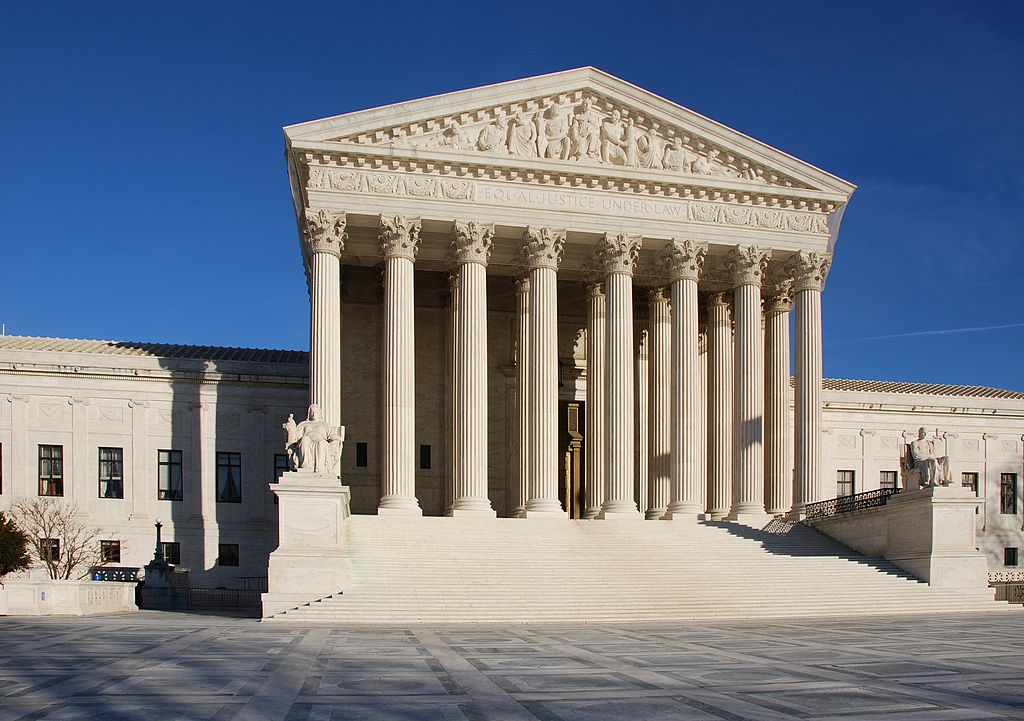The Supreme Court of the United States (SCOTUS) issued decisions in five cases this week. The court has issued decisions in 52 cases so far this term. The court usually finishes releasing all opinions for the term by the end of June. This year, the court will issue opinions in July for the first time since 1996.
The case: USAID v. Alliance for Open Society International concerned the United States Leadership Against HIV/AIDS, Tuberculosis, and Malaria Act of 2003 (the Leadership Act). The Leadership Act required U.S. and foreign organizations that fight HIV/AIDS overseas to explicitly adopt a policy opposing prostitution and sex trafficking. A 2013 U.S. Supreme Court case ruled the requirement to adopt this policy was unconstitutional for U.S. organizations.
After the 2013 ruling, the U.S. government continued to apply the policy requirement to foreign affiliates of U.S. organizations fighting HIV/AIDS overseas. The Alliance for Open Society International (AOSI) challenged this interpretation.
The outcome: The court reversed the 2nd Circuit’s decision in a 5-3 ruling, holding foreign affiliates of U.S.-based organizations that receive federal funds to fight HIV/AIDS abroad are not protected under the U.S. Constitution. Therefore, the policy requirement for foreign affiliates is constitutional. Justice Brett Kavanaugh wrote for the majority, “In short, plaintiffs’ foreign affiliates are foreign organizations, and foreign organizations operating abroad have no First Amendment rights.”
The case: June Medical Services v. Russo concerned Louisiana Act 620, which required doctors performing abortions to have admitting privileges in nearby hospitals. June Medical Services, a clinic in Shreveport, Louisiana, challenged Louisiana Act 620 in court. While June Medical Services’ lawsuit was ongoing, the U.S. Supreme Court held in Whole Woman’s Health v. Hellerstedt that a Texas law similar to Act 620 was unconstitutional.
The Middle District of Louisiana then held Act 620 was unconstitutional. On appeal, the 5th Circuit reversed the district court’s ruling. June Medical Services appealed to the U.S. Supreme Court, arguing the 5th Circuit’s ruling “conflicts with Whole Woman’s Health in its result and its reasoning.”
The outcome: The court reversed the 5th Circuit’s decision in a 5-4 ruling, holding Act 620 was unconstitutional.
The case: Seila Law v. Consumer Financial Protection Bureau concerned the extent of the president’s appointment and removal powers. The Consumer Financial Protection Bureau (CFPB) issued a civil investigative demand to the California-based firm, Seila Law. Seila Law refused to comply, so the agency petitioned the U.S. District Court for the Central District of California, asking it to enforce the demand. Seila Law responded by arguing that the CFPB violated the U.S. Constitution’s separation of powers doctrine.
The Dodd-Frank Act created the CFPB in 2010. 12 U.S.C. §5491(c)(3) of the Act established one agency director, a presidential appointee subject to Senate confirmation. The director serves a five-year term, and can be removed only for cause—”inefficiency, neglect of duty, or malfeasance in office.”
The outcome: The U.S. Supreme Court held in a 5-4 opinion that the structure of the CFPB violated the separation of powers and that the removal power restrictions could be severed from the rest of the Dodd-Frank Act.
The case: Espinoza v. Montana Department of Revenue concerned whether the government can exclude religious institutions from student-aid programs and relates to Article X, Section 6 of the Montana Constitution, also known as Montana’s Blaine Amendment.
A 2015 Montana law established a tax credit scholarship program that matched—up to $150 a year—taxpayer donations to organizations that issued scholarships for private school students. To ensure compliance with the Montana Constitution, the state Department of Revenue established Rule 1, which barred recipients from using the scholarships at religiously-affiliated private schools. The plaintiffs, three mothers whose children attended religious-affiliated private schools, challenged Rule 1. The Montana 11th Judicial District granted summary judgment to the plaintiffs, prohibiting the rule’s enforcement. On appeal, the Montana Supreme Court reversed the 11th Judicial District’s ruling, holding the law violated the state constitution’s Blaine Amendment.
The outcome: The U.S. Supreme Court reversed and remanded the Montana Supreme Court’s ruling in a 5-4 opinion, holding Article X, Section 6 violated the free exercise clause by barring religious schools and parents who wished to send their children to those schools from receiving public benefits because of the religious character of the school.
The case: United States Patent and Trademark Office v. Booking.com B.V. concerned federal trademark registration eligibility. The U.S. Patent and Trademark Office (USPTO) denied Booking.com’s four applications to trademark the name Booking.com. The USPTO said the name was generic and not a protectable mark. After several lower court appeals, the USPTO petitioned the U.S. Supreme Court to review the case.
The outcome: The court affirmed the 4th Circuit’s decision in an 8-1 ruling, holding a “generic.com” term is not a generic name for a class of goods or services if consumers recognize the term as distinguishing among members of that class. In those circumstances, “generic.com” (or, in this case, “Booking.com”) is eligible for federal trademark registration.
Additional reading:
https://ballotpedia.org/USAID_v._Alliance_for_Open_Society_International
https://ballotpedia.org/June_Medical_Services_LLC_v._Russo
https://ballotpedia.org/Seila_Law_v._Consumer_Financial_Protection_Bureau
https://ballotpedia.org/Espinoza_v._Montana_Department_of_Revenue
https://ballotpedia.org/United_States_Patent_and_Trademark_Office_v._Booking.com_B.V.


